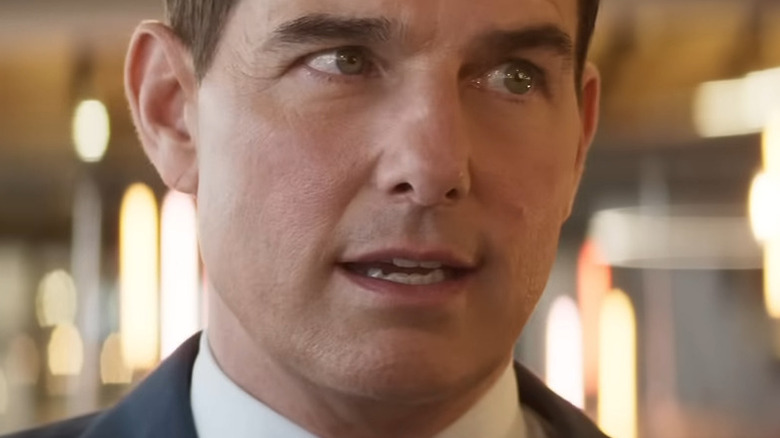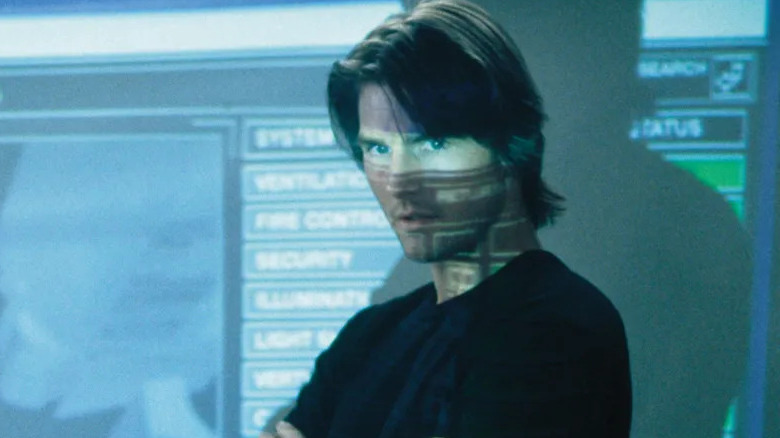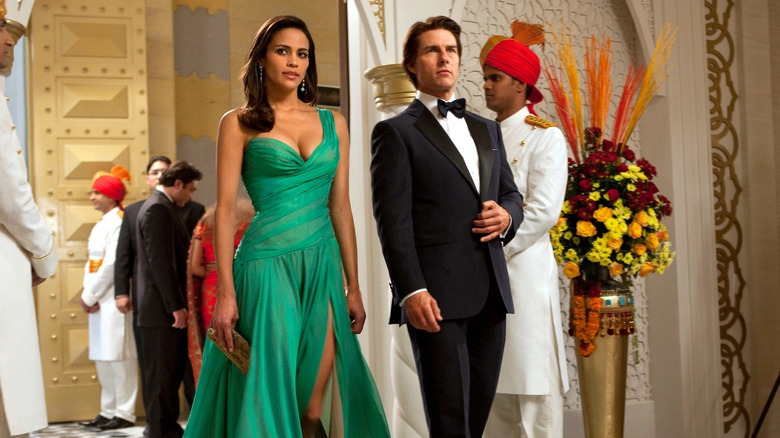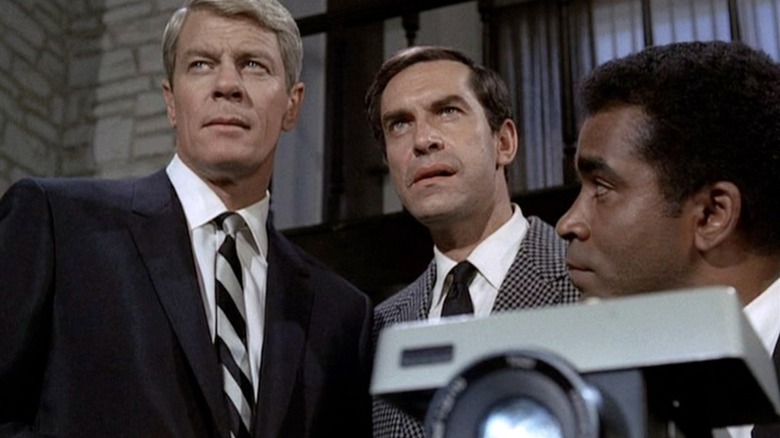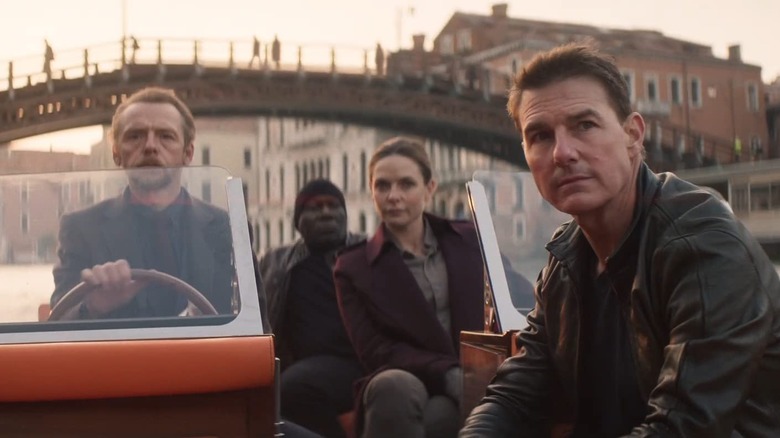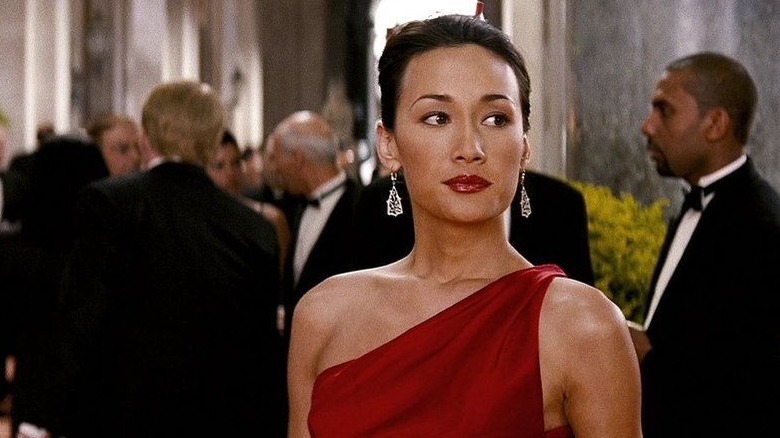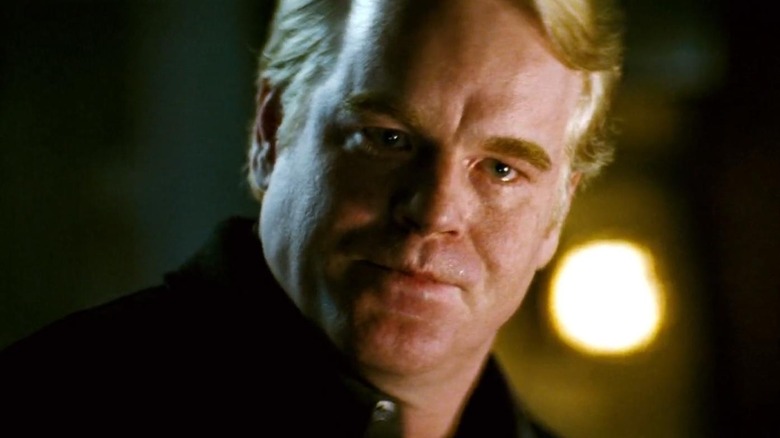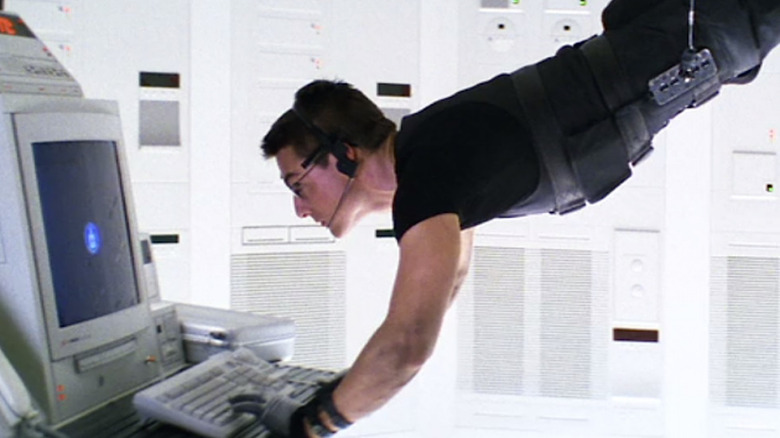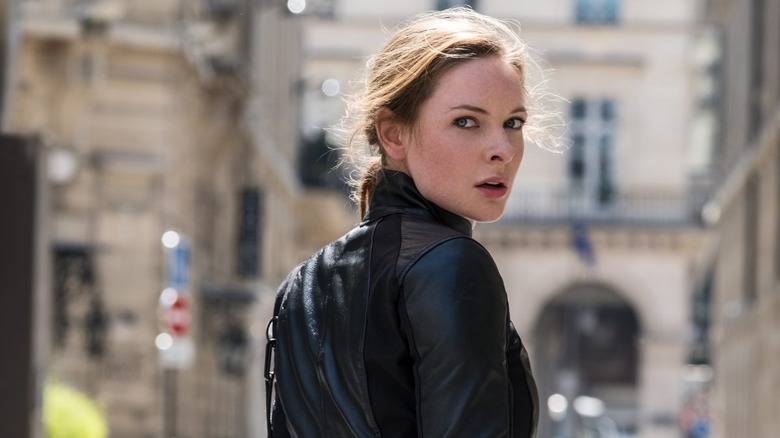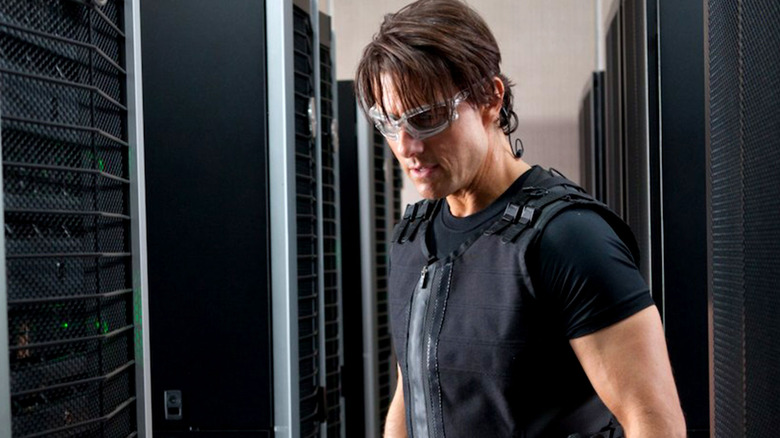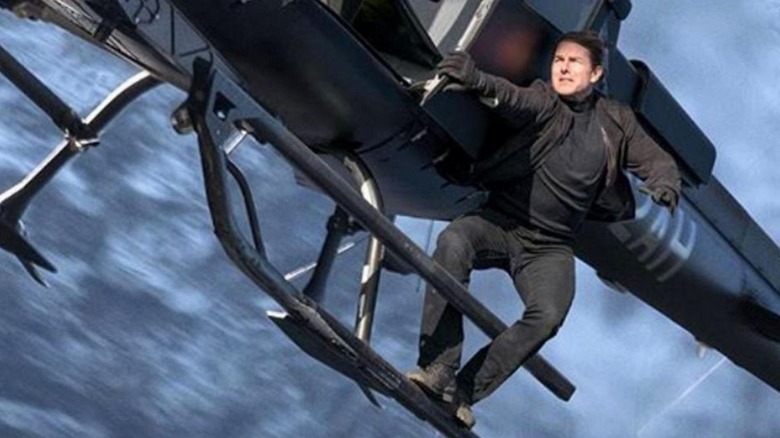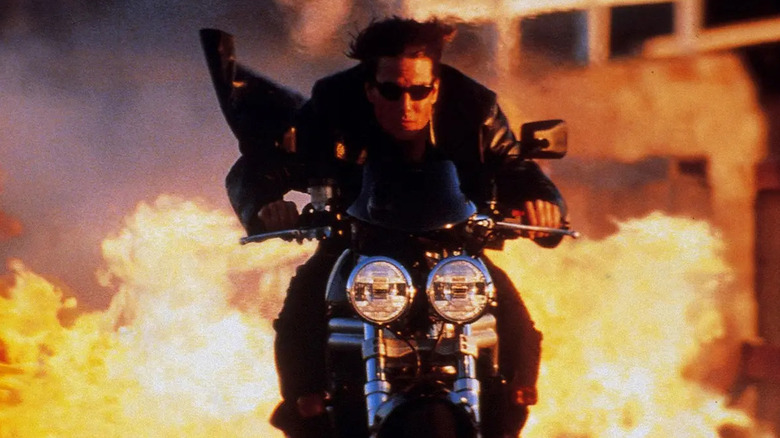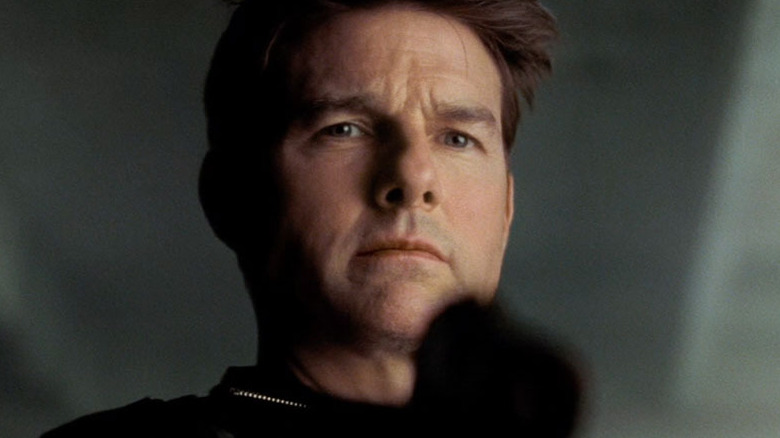The Best And Worst Things From The Mission: Impossible Franchise
In the 1990s, taking beloved 1960s TV series into movies was all the rage, with the likes of "The Addams Family," "The Fugitive," and even "The Flintstones" getting cinematic adaptations. In 1996, director Brian De Palma gave the big screen treatment to another iconic '60s action series, "Mission: Impossible," starring Tom Cruise as the leader of an elite team of special force operatives called the Impossible Missions Force (or IMF for short). The film was a big hit and kicked off a new spy film series that continues in 2023.
Featuring dramatic spy stories and impressive action sequences, the film series has dazzled audiences for decades and given Cruise his own long-running franchise. With one exception (and we'll get to that in time), every one of the "Mission: Impossible" films has been met with resounding cheers by audiences, and for good reason, as there's a lot to love about the series from its high drama and impeccable tension down to its instantly hummable theme song.
But "Mission: Impossible" isn't perfect either, and over the years there've been a few flaws in the franchise. So now, our mission (and we choose to accept it) is to uncover the best and worst things about the "Mission: Impossible" franchise.
Worst: Formulaic elements
If the "Mission: Impossible" film series has a serious flaw, it might be its formulaic elements that seem to repeat themselves in each movie. While these elements are typically well done, it does sometimes dim the glow of what could otherwise have been an even brighter movie. Because when with repetitive story beats — from the IMF's loyalties being tested thanks to a dastardly plot by a mystery villain, to Ethan Hunt's daring escapes — it can sometimes become a little too easy to see what's coming. Considering that being surprising and unpredictable is one of the most important ingredients to a good spy story, that can be a problem.
Likewise, we often see Hunt and his IMF team come close to an easy or early victory, but we always know something is going to go wrong because it always does. Major character deaths are rarely a surprise anymore, and we know Cruise is going to get a chance to run like a madman at least once. There's always one ally who betrays them, making any attempted shock twist a reveal you see coming miles away.
To be fair, the films are built off the back of a formulaic TV series that essentially recycled the same stories over and over. But we still wish they could try to come up with something truly new and daring for the big screen in each movie to keep us guessing.
Best: The perfect tone
Over the years, there have been many movies that have tried to get the spy genre right, but few have succeeded with as much aplomb to become a franchise. And while "Jason Bourne" took the tack of being a serious, more grim action thriller series, only "Mission: Impossible" has been the pitch-perfect kind of adventure that deftly mixes over-the-top action, compelling intrigue, nail-biting suspense, and a healthy dose of light-hearted humor.
Thanks largely to one of the best rosters of directors a series has seen this side of "Harry Potter," the likes of Brian De Palma ("Scarface"), J.J. Abrams ("Star Trek"), Brad Bird ("The Incredibles"), and Christopher McQuarrie ("Jack Reacher") have mixed all of those elements together successfully when so many others have tried and failed. Strong scripts combine captivating stories with a truly riveting mystery with a level of suspense usually reserved for horror movies. And yet somehow through it all, there's a level of sheer fun and excitement that delivers tense, fast-paced action while still making you smile from the simple joy of seeing the good guys get it done.
It's never easy to strike the proper balance between action movie, spy thriller, and mostly-family adventure, but "Mission: Impossible" has done it time and time again. From globe-trotting adventures through lush locales, the directors have done it just right, and they didn't even need any colorful superheroes to do it.
Worst: Its forgotten the original TV series
Younger audiences may not remember that the "Mission: Impossible" movies are based on a TV series. When the first film debuted in 1996, it had been 24 years since the TV show had ended. But one thing that set the films apart from so many big-screen adaptations of classic TV shows was that it was not a reboot or remake, but ostensibly a sequel to the small-screen version. In fact, the entire plot of the first movie revolved around Jim Phelps — the lead IMF agent in the TV series — betraying the team. Unfortunately, since that time, it seems the series has all but severed any connections to the show.
That's really a shame too, because "Mission: Impossible" was genuinely one of the finest spy series on television. It had deep lore that spanned multiple shows, including a 1988 revival that ran for two seasons, and yet the films have seemed to leave it all behind after the 1996 debut. That the original movie went so far as to tie itself into the show when it certainly didn't have to makes its overt dismissal of the series in subsequent films feel like a missed opportunity. The original series featured some immensely talented stars including late actors Martin Landau and Leonard Nimoy, and the films missed the chance for them to reprise their roles before they passed away.
Best: The ensemble casts
"Mission: Impossible" is often seen as a modern version of the "James Bond" franchise; both are slickly produced spy films centered on a charismatic and charming leading man and punctuated by over-the-top stunts. In some ways the comparison is apt, and some have argued that its success even helped push the "Bond" films to be reinvented for the 21st century. But while both franchises share some of the same hallmarks, one of the most critical differences that set "Mission: Impossible" apart from its forebears is its ensemble cast.
Like the TV show on which it's based, "Mission: Impossible" isn't just about Ethan Hunt as a solo secret agent. Alongside him is his highly trained IMF team, comprised of specialists in different disciplines, adding a group dynamic that other spy movies usually lack. From computer hackers like Luther Stickell and Benji Dunn to field agents like Ilsa Faust and William Brandt to the various IMF directors like Theodore Brassell and Alan Hunley, some of the best characters in the "M:I" saga aren't Ethan Hunt. Even more impressive is the incredible roster of actors secured to play them with Ving Rhames, Simon Pegg, Rebecca Ferguson, Jeremy Renner, Laurence Fishburne, and Alec Baldwin turning the films into an all-star ensemble to rival "The Avengers."
For as much as we love Hunt, it's the dynamic between the hard-nosed IMF team leader and his diverse and sometimes eccentric partners that make "Mission: Impossible" so much fun.
Worst: Characters left behind
Though one of the strengths of the "Mission: Impossible" series is its strong ensemble cast, that same asset brings with it an unfortunate downside. With so many characters coming in and out of the films, inevitably some of the best often get forgotten and left behind. The two biggest offenders in this regard might be Maggie Q as Zhen Li in "Mission: Impossible II" and Paula Patton as Jane Carter in "Ghost Protocol." Both impressed in their respective films, yet neither returned for further entries in the series, sadly becoming one-and-done characters.
Jeremy Renner as William Brandt likewise bowed out after just two films in the series, nowhere to be found in "Fallout." More strangely, it seems the role of intelligence agency director is all too often a single-movie character, with the likes of Laurence Fishburne, Anthony Hopkins, and Angela Bassett each only getting one go-round. And while Alec Baldwin's Director Hundley did return for a second appearance, he was unceremoniously killed off in "Fallout." On the flip side, Kittridge — IMF Director in the very first film — finally returned in the seventh installment, "Dead Reckoning."
Though in some cases these are the results of actors not wanting to return, it also feels like a case of wasted opportunity. Star actors playing strong characters should be retained for follow-ups, but are tragically left behind all too often.
Best: Formidable foes
Among the brightest spots of every "Mission: Impossible" film is its formidable foes who take on Hunt and his IMF team. And they've come in all forms, from the first film's villain — a mysterious criminal mastermind known only as Max who turned out to be a woman played by Vanessa Redgrave — to the diabolical international terrorists like August Walker and Solomon Lane. But arguably the series' most compelling baddie is the late Philip Seymour Hoffman as Owen Davian in 2006's "Mission: Impossible III," a madman seeking a powerful weapon called the Rabbit's Foot.
Hoffman's riveting and downright frighteningly sadistic performance as arms dealer Davian underscores the series' unique ability to use its foes not as stunt-casted super-villains, but as compelling and smartly crafted adversaries. They rarely have personal ties to Hunt, instead with their own unique motivations and goals, and are often the most compelling character in the film, while also being very different from one another. Their henchmen and thugs too are memorable baddies without being gimmicky like a goofy Bond villain and help flesh out the films with ever more ruthless enemies for the IMF team.
Plus, with a roster of incredibly gifted and often sorely underrated actors playing them — including Henry Cavill, Sean Harris, Jean Reno, Billy Crudup, and French actress Léa Seydoux — there's some serious talent on display as well.
Worst: Those early movies feel awfully dated
Directed by Brian De Palma — a veteran of award-winning crime drama "The Untouchables" — the first "Mission: Impossible" film was more of an espionage thriller than what the franchise has since become. But while it boasted a more gritty realism than that other notable spy series, on repeated viewings it might surprise you to realize that quite a bit of it doesn't hold up so well more than 25 years later.
As it happens, much of how we remember the first film may come from rose-colored glasses. Oh, that's not to say it isn't great, it absolutely is; the ratcheting tension is first rate and the heist sequence still gets our hair raising. But just for starters, the tech feels extremely quaint, and that's not just because the film was made before smartphones. It's also because most viewers in 1996 were barely computer literate, so the movie treads lightly so as not to confuse the audience. For example, Hunt's use of e-mail and the website "Max.com" is hilariously childish in hindsight, yet we are to believe he's a highly trained intelligence operative.
Likewise, the action in the first film is surprisingly sparse. Sure, a top-notch train chase at the climax still works today. But the fact that the big action sequence highlighted in the trailer is Tom Cruise running from a restaurant fish tank should tell you the size and scope of the movie's relatively modest stunt work.
Best: Fierce women
The first "Mission: Impossible" in 1996 fails the Bechdel test, with its lead female character there for little more than to serve as a lover to betray Hunt. Then, "Mission: Impossible II" sadly gives just one woman a speaking role, with Thandiwe Newton as Nya Nordoff-Hall, a highly trained pro thief recruited by the IMF, and she's little more than a love interest and damsel in distress. Thankfully, later films in the saga more than made up for it. It begins with "Mission: Impossible III," with Maggie Q as Zhen Lei, the first woman IMF agent not to be romantically linked to Hunt, and from there, things only get better for the women of "Mission: Impossible."
"Ghost Protocol" stars Paula Patton as agent Jane Carter, while "Rogue Nation" introduces Rebecca Ferguson as MI6 agent Ilsa Faust, and "Fallout" gifts us Vanessa Kirby as the villain known as the White Widow, and there are more in supporting roles like Zhang Jingchu and Angela Bassett. Some of these women are introduced as lovers of unseen characters — a villain here, a dead IMF agent there — they are fierce and formidable women with their own agency. The treatment of women hasn't been perfect, but the series' biggest female heroes are portrayed as just as tough, capable, and respected as Hunt. Some of them even come to the rescue of their male co-stars on more than one occasion, and they've become one of the series' biggest strengths.
Worst: They've become increasingly shallow
While we just heaped the "Mission: Impossible" film saga for its strong stories and high levels of intrigue that keep audiences at rapt attention, we can't help but notice that as the series has worn on, those elements have become somewhat diminished. Earlier entries in the series are laser-focused on the plot, with a villain's complex scheme uncovered and unraveled by Hunt and his IMF team. The story is then elevated by a few carefully placed but impressive action sequences that are never too much, just the right amount of spectacle that supported the story rather than distracted.
In later "Mission: Impossible" films, however, the stunts and action go further and bigger, topping itself over and over, until the story begins to seem almost secondary. While few will forget the many unbelievable action scenes, it sometimes seems like the details of the plot are quickly glossed, and sometimes a mere afterthought. It's hard to say if this is a failure, however, as the films have continued to receive rave reviews from both audiences and critics alike to an almost unparalleled degree, and the box office bucks have continued their ascent.
But while the stories are enough to keep our attention, they seem to be less and less what the films are really about. These days, the focus is clearly on the visual splendor and those jaw-dropping stunts.
Best: The jaw-dropping stunts
Sure, we may be a little disappointed by the fact that the later films in the franchise have shifted the focus away from spy stories and espionage somewhat, but we can't blame them when the stunts are this eye-popping. It makes perfect sense that as the franchise strove to one-up itself with each film, more and more of the attention would be paid to those stunts because up on the big screen, that's what brings the audience to their feet. And if you're going to see a movie where they put the action front and center, there are none that go further than "Mission: Impossible."
Cruise is well known for doing his own stunts, while his writers, directors, and stunt coordinators continue to push the envelope with little use of CGI. From his climb of the Burj Khalifa in "Ghost Protocol" to his helicopter chase in "Fallout," Cruise has gone the extra mile, and it seems like every film is setting some kind of history. The stunts have gotten so big and so over-the-top that the marketing around each new film often revolves around how Cruise and crew carried out their latest death-defying stunt. When it comes to spectacle and dangerouts stunts, no franchise does it better.
Worst: Mission: Impossible II
For many "Mission: Impossible" fans, the less said about "Mission: Impossible II" the better. But in a list of "worsts" about the franchise, the first sequel has to top the list. Because everything that made the debut film great — its steady, mature spy thriller tone and surprisingly understated action — goes out the window. Directed by Hong Kong filmmaker, John Woo, a master of over-the-top action, the sequel cranks the dial up to 11 and beyond, and often feels like a movie from an entirely different series.
With an incoherent plot populated by human caricatures, even the action itself makes little sense, coming across more like a cartoon than a gritty thriller. In fairness, Woo is a man with a true gift for action and has made plenty of brilliant movies, including "Face/Off," one of the best '90s action movies. And while some of the spectacle in "M:I-2" makes for decent popcorn entertainment at times, stacked up against the rest of the franchise, the film is a major eyesore. It's the only film to receive a "rotten" rating, while its "too cool for school" style barely worked at the time, and is a poor fit for the series.
Woo and Cruise have each crafted some of the best action movies of all time, but together they don't mix. From nauseating amounts of zooms and slow-motion to its eye-rolling use of Limp Bizkit music, it's the one film in the series we just pretend doesn't exist.
Best: Tom Cruise
Incredibly, the "Mission: Impossible" film series will have endured for more than 25 years and will have a total of eight films when it comes to a close with "The Final Reckoning." It's rare that a franchise can last for so long, let alone have such incredible success, and "Mission: Impossible" has done it while continuing to get better. In fact, since "M:I-2" in 2000, every movie has been a box office smash and received critical acclaim. But the most special feat it's accomplished that sets it apart from so many others is that it's done it all with the same star: the seemingly ageless Tom Cruise.
Often dubbed "the last true movie star," Cruise's endless charisma, gung-ho spirit, and steely-eyed performance has kept audiences coming back. A dedicated performer, Cruise famously broke his ankle during a stunt but never stopped. But he's been more than just an action hero and stuntman and has done more than just lead the series as its star. He is also a producer, helping to guide it with a steady hand, often personally picking directors and actors (and in the process making at least one man's entire career because of it).
Cruise has pushed the franchise to be bigger and bolder while leading his cast and crew as a veritable force of nature. What would the franchise be without Cruise? Impossible to say, but it's hard to imagine a Cruise-less "Mission: Impossible" series being this much of a success.
